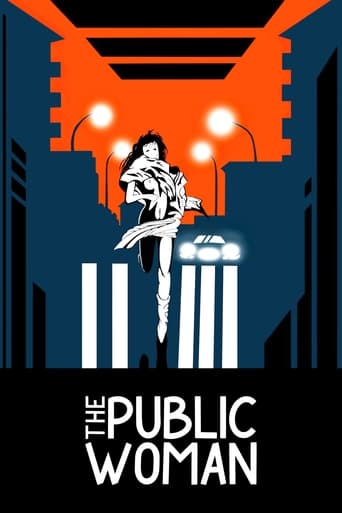



Absolutely Fantastic
a film so unique, intoxicating and bizarre that it not only demands another viewing, but is also forgivable as a satirical comedy where the jokes eventually take the back seat.
View MoreBlistering performances.
Great example of an old-fashioned, pure-at-heart escapist event movie that doesn't pretend to be anything that it's not and has boat loads of fun being its own ludicrous self.
View MoreStruggling actress Ethel (Valérie Kaprisky) does private nude modeling sessions for photographer André. Famed director Lucas Kessling wants her as lead in his adaptation of Dostoyevsky's "The Possessed". They get into a relationship and a surreal film production. He recruits dishwasher Milan Mliska (Lambert Wilson) to be her possessive disturbed husband as reality and fiction blend into this unreal journey.This is an unreal film. Kaprisky is sexually unencumbered and magnetically charismatic. She does plenty of strut-walking. She powerfully fills the screen. Lucas Kessling is an intriguing mercurial character. The surrealism is interesting at first but it gets maddeningly unreal. The wild swings and crazy 180 turns frustrated me. There is one scene in particular where Ethel faints and completely recover immediately with everybody ignoring what happened. It's a cheap kind of surrealism. It's almost student film level. Other parts like her nude photography is unforgettable. At some point, the weird surreal twists and turns bored me by their unhinged-nature.
View MoreThe 5th feature from the late Polish director Andrzej Zulawski (1940-2016), THE PUBLIC WOMAN is a French production, starring Valérie Kaprisky as a young girl Ethel, who has been chosen by the film director Lucas Kessling (Huster), a Czech immigrant, to star in his movie adaptation of Dostoyevsky's novel "THE POSSESSED, aka. DEMONS", which is shot in Paris.Ethel has no acting experience, it is her raw sexual appeal turns on the egoistic Lucas, he hooks up with her but finds her lacking in dramatisation and articulation of her character during the filmmaking, which itself is a constant jag of kerfuffle and chaos. Zulawski engages a freewheeling style to the angles of frame, which is navigated with ingenious dexterity by the legendary cinematographer Sacha Vierny, and he proffers us a close look of the process of making film in a crammed set, with slickly choreographed mobility and a hammy cast aggravated by heavy cosmetics.After mounting a humiliating remonstration on Ethel for her incompetence, Lucas fires her and the narrative shifts from the sadomasochistic relationship between them to a new chapter, when Elena (Delor), a Czech actress, one of Lucas' mistress, goes missing, Ethel implausibly takes the imposture as Elena and plunges herself into a steamy relationship with Elena's husband Milan Mliska (Wilson), a frail, self-abusing (glass-chewing) young man who later will be involved into a political assassin of a Lithuanian cardinal and is hunted; thereafter, Lucas decides to re-hire Ethel for the role and she is sandwiched between him and Milan, both are driven mad by petit jealousy until one of them is forever out of the picture, and Ethel will finally triumph with a tour-de-force to show that an "actress" is born.Being an art-house endeavour, nudity (notoriously for Ethel's two naked dancing sequences) and explicit sex scenes are indispensable here, which even leave a bitter taste of gratuitous exploitation; and we can clearly see the dummy in the sole car chasing set piece, a telling proof that commercial cinema is not such an easy piece of pie to emulate. But Kaprisky emotes beautifully from the taxing requirements her role entails, both physically and mentally; a blond Huster, with a haunting resemblance of a less delicate Farley Granger, is unwaveringly committed, but sometimes he is overbearingly tiresome; last but not the least, a young Wilson establishes himself in his early career that he can be madly charming and charmingly mad simultaneously.Concocted with a little political allusion, a fairly firm buttress of female-empowerment under the patriarchal repression, an excessive amount of exotica and a largely madcap storyline, THE PUBLIC WOMAN does not give full justice to Zulawski's talent, although it will stay with you for its convivial self-awareness of its subject as the cast takes a bow in the last scene, it is a theatrical farce, but done with a certain degree of flourish.
View MoreI love this guy, this madman and anarchist of cinema. I love him for the reasons he seems to vex a lot of people; muddled screenplays is the frequent complaint, hard to understand, extreme in everything he does. It is simply a matter of approach. In ordinary films, the filmmaker presents a more or less conventionally understood reality, and asks of us to penetrate behind the words and masks of people hiding their true selves, to get to something essential of emotions and dynamics. We infer from a subtle gesture, from a meaningful look.Zulawski's method is one of shattering the clean boundaries of roles and framed narrative, all the things that keep us at arm's length from ever really feeling the soul of a character in our skin, doing so with impunity, so that we are free to swim and see into the inner world of urges and emotional thought, pure mindstream. What you would normally have to infer is up there on the screen. The skin of consciousness has been turned inside out, reversed: the pedantic details of all this having linear sense and plot are now beyond our reach, the actual battered soul is visible.This is nothing to scoff at, in fact it is the most advanced dimension in film. Reversed innerseeing. Ecstatically hovering out of self and story. It is what Lynch only accomplished with Inland Empire, acknowledging the Polish influence.Possession is sublime, the pure convulsing horror of a soul being torn apart. It was out of this world, everyone from Cronenberg to Lynch sat down and took notice. The story goes that he was so hellbent on that film to coax the raw emotion he wanted out of Isabelle Adjani, he did some pretty horrible things to her. Here is the followup to that: an obsessive, half-mad filmmaker (ex-pat working in France) torments his young starlet on the artistic journey to perfection. Their film is an adaptation of Dostoyevski's The Possessed (wink). She is eager, talented, but the murky depths of his vision escape her.Everything else is madness, flailing, fluid self, the exposing of raw nerves in the frantic experience of the mindstream.This seems murkier than Possession, because it lacks the actual monster and clean symmetry of doubles. It's in the same vein. Forces in these people are so painful and overwhelming, the characters have splintered into several more selves, and each splintered self is maniacally pushing against the limits of his narrative - some of them inside the play, others in separate subplots. Two ex-pats, frustrated in Paris with the hypocrisy of art and religion - one of the murders a cardinal, both are present in the scene, both photographed in a film-within. Two actresses, both mistresses of the same two guys.So he is angrier than Tarkovsky. Has none of Malick's piousness. Ruiz and Wojciech Has are playful, he is bitter and mad. He sees ugliness, sin, impurity. And he has several rough spots, of symmetry and politicking, both shouted.But he worships the same awesome god: not the cardinals' god, but the recognition of something that goes beyond the small limits of reason and self, and tries to awaken the vastness of that in his own narratives of fluid and battered egos.And he has trusted collaborators on the journey. Valerie Kaprisky is divine, ecstatic dancer to the mystery of shedding skin.Sacha Vierny, that mage of cinematic light; Resnais, Greenaway, Ruiz, Zulawski, he has enriched all four with his eye.And if all of that seems gibberish to you, you should know of the rich tradition of Buddhist gurus called mahasiddhas, who used madness and gibberish as a tool for wisdom. A similar notion of desired irrationality is encountered from Zen to Dada.The thinking mind is a meddlesome monkey. Confound, confound, confound. Something to meditate upon.
View MoreThis movie might confuse and frustrate viewers and rightly so, for it's lack of discernible plot elements and objectives, but rightly so because Throughout his career Zulawsky as director is more concerned with making his viewers go thru the raw emotions, sights and situations rather than drawing conclusions or tying plots.The key in this film is that everything is experienced thru the point of view of Ethel - a stunning Valerie Kaprisky - we are limited to what she experiences and thinks, and it is a very emotionally charged view, one in which only the senses and guts can be trusted ... to an extent.This might be obvious, but the film also deals with a lot about sexuality, there is a lot of sexual tension throughout the film, right from the title and the first images the main force driving the film is the associative and intuitive.The production is very detailed, and impressive in the sense that is firmly supportive of the history, I have always found Zulawsky a superior director in his choice of locations, actors, misè-en-scene, etc.Finally it has a bit of uneven pace, and in the end this movie is more a feast for the senses than an intellectual mystery.
View More